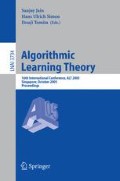Abstract
In this paper, we study inferability of Prolog programs from positive examples alone. We define a class of Prolog programs called recursion bounded programs that can capture non-linear relationships between inputs and outputs and yet inferable from positive examples. This class is rich enough to include many programs like append, delete, insert, reverse, permute, count, listsum, listproduct, insertion-sort, quick-sort on lists, various tree traversal programs and addition, multiplication, factorial, power on natural numbers. The relation between our results and the known results is also discussed. In particular, the class of recursion bounded programs contains all the known terminating linearly-moded Prolog programs of Krishna Rao [7] and additional programs like power on natural numbers which do not belong to the class of linearly-moded programs and the class of safe programs of Martin and Sharma [12].
Access this chapter
Tax calculation will be finalised at checkout
Purchases are for personal use only
Preview
Unable to display preview. Download preview PDF.
References
Angluin, D.: Inductive inference of formal languages from positive data. Information and Control 45, 117–135 (1980)
Apt, K.R., Pedreschi, D.: Reasoning about termination of pure Prolog programs. Information and Computation 106, 109–157 (1993)
Arimura, H., Shinohara, T., Otsuki, S.: In: Enjalbert, P., Mayr, E.W., Wagner, K.W. (eds.) STACS 1994. LNCS, vol. 775, pp. 649–660. Springer, Heidelberg (1994)
Arimura, H., Shinohara, T.: Inductive inference of Prolog programs with linear data dependency from positive data. In: Proc. Information Modelling and Knowledge Bases V, pp. 365–375. IOS press, Amsterdam (1994)
Blum, L., Blum, M.: Towards a mathematical theory of inductive inference. Information and Control 28, 125–155 (1975)
Gold, E.M.: Language identification in the limit. Information and Control 10, 447–474 (1967)
Krishna Rao, M.R.K.: Some classes of Prolog programs inferable from positive data. Theor. Comput. Sci. 241, 211–234 (2000)
Krishna Rao, M.R.K.: Inductive inference of term rewriting systems from positive data. In: Ben-David, S., Case, J., Maruoka, A. (eds.) ALT 2004. LNCS (LNAI), vol. 3244, pp. 69–82. Springer, Heidelberg (2004)
Krishna Rao, M.R.K., Shyamasundar, R.K.: Unification-free execution of well-moded Prolog programs. In: Mycroft, A. (ed.) SAS 1995. LNCS, vol. 983, pp. 243–260. Springer, Heidelberg (1995)
Lloyd, J.W.: Foundations of Logic Programming. Springer, Heidelberg (1987)
Martin, E.: Personal communication (2005)
Martin, É., Sharma, A.: On sufficient conditions for learnability of logic programs from positive data. In: Džeroski, S., Flach, P.A. (eds.) ILP 1999. LNCS (LNAI), vol. 1634, pp. 198–209. Springer, Heidelberg (1999)
Shapiro, E.: Inductive inference of theories from facts, Tech. Rep., Yale Univ. (1981)
Shapiro, E.: Algorithmic Program Debugging. MIT Press, Cambridge (1983)
Shinohara, T.: Inductive inference of monotonic formal systems from positive data. New Generation Computing 8, 371–384 (1991)
Shinohara, T., Arimura, H.: Inductive inference of unbounded unions of pattern languages from positive data. Theor. Comput. Sci. 241, 191–209 (2000)
Sterling, L., Shapiro, E.: The Art of Prolog. MIT Press, Cambridge (1994)
Author information
Authors and Affiliations
Editor information
Editors and Affiliations
Rights and permissions
Copyright information
© 2005 Springer-Verlag Berlin Heidelberg
About this paper
Cite this paper
Rao, M.R.K.K. (2005). A Class of Prolog Programs with Non-linear Outputs Inferable from Positive Data. In: Jain, S., Simon, H.U., Tomita, E. (eds) Algorithmic Learning Theory. ALT 2005. Lecture Notes in Computer Science(), vol 3734. Springer, Berlin, Heidelberg. https://doi.org/10.1007/11564089_25
Download citation
DOI: https://doi.org/10.1007/11564089_25
Publisher Name: Springer, Berlin, Heidelberg
Print ISBN: 978-3-540-29242-5
Online ISBN: 978-3-540-31696-1
eBook Packages: Computer ScienceComputer Science (R0)

